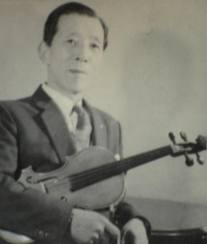Studio Foundation
Shinichi Suzuki
Teachings in this studio are based on the philosophy of Dr. Shinichi Suzuki. His philosophy states that every child can have his talent developed through a rich and positive musical environment. Creating this environment is the responsibility of the teacher and the parent.
Who is Dr. Shinichi Suzuki? by Linda S. Schmidt
Dr. Shinichi Suzuki (1898-1998) developed a method for teaching very young children to play the violin. He felt beginning at age four was perfect, but every age can learn. He developed this method in the devastated post - WW II in Japan. He taught violin in hopes of elevating the spirits of the people, and desiring to improve the Japanese culture. He thought that through the discipline and training of learning to become fine violinists, a society of fine individuals would develop who would be able to prevent future wars. As he learned to teach children, he developed his unique ideas from his life experiences, which became known as the Suzuki Method.
Shinichi Suzuki was born in 1898, and grew up in Japan in the early 1900's. His family was wealthy because his father owned a violin manufacturing plant. They instilled high moral values and a strong work ethic. Though violins were readily available to Shinichi, he did not begin to learn to play until he was seventeen years old. It was then that he heard the first beautiful recording of violin music on the new invention called the Victrola (which preceded record players). He listened to the recording over and over again. He finally taught himself how to play the violin by listening to this recording. For the next three years, he identified performers to teach him to play the violin in Japan.
He was sent on a trip to Europe by his father. Shinichi ended up in Vienna and studied the violin with master teachers there. He was mentored in the 1920's by the renowned scientist, Albert Einstein, who was a violinist. He learned much from playing with Einstein and his friends. He felt that associating with high quality individuals created a humble heart of high quality.
He married a German woman, named Waltraud, just before the war. Japanese authorities and difficult circumstances separated them for a time after World War II. One of his former students was orphaned during the war, and his behavior had become streetwise. Suzuki decided to adopt this young teenager into his home. Suzuki's experiences of raising the teenage boy helped him develop his thoughts about discipline and correction. He decided to eliminate criticism and encourage the good things he saw the boy doing. He began the boy's violin training again. These experiences helped him develop the philosophies of his widely read book, Nurtured by Love.
Dr. Suzuki founded the Talent Education Institute and taught all types of children. He found that with patient, consistent practicing of small tasks, any child could learn to play the violin. He even taught a blind child and a girl with polio. Thus, he developed his belief that ALL children can learn to play an instrument with proper patience and guidance.
He was also struck by the truth that every child learns to speak his native language, even difficult ones like Japanese. He analyzed the way this happened, leading to his theory of the Mother Tongue Method. He applied the principles of learning language to learning to play the violin. He observed that little children listen in an environment rich in their language. He noted that children first learn to speak before they learn to read their language. Also, mothers repeat and encourage learning single words first. Much language is learned in the home, taught by the mother, in these early years before beginning formal education.
He believed that the child's environment should be made rich with the playing of high quality recorded music. He believed that the violin should be learned by learning tiny tasks one at a time. He felt that students should learn to play the instrument before they learn to read music. He felt that the parents play a vital role in teaching in a very natural way.
The Basic Tenets of the Suzuki Method:
- Children begin to learn to play when they are very young.
- Repeated listening of recordings naturally leads to producting the music on the instrument.
- Children learn to play the instrument in tiny, sequential, repeated steps.
- All children can learn, given the proper patience and guidance.
- The parents provide an atmosphere of loving encouragement, surrounded by music.
- Children learn to play the instrument before learning to read music.
- Parents are the at-home teachers of the child, and often learn first to model correct playing.
"The purpose of Talent Education is to train children...to be fine musicians, and to show high ability in any other field they enter." - Dr. Suzuki
"Dr. Suzuki's goal was not simply to develop professional musicians, but to nurture loving human beings and help develop each child's character through the study of music." - the SAA (Suzuki Association of the Americas)
